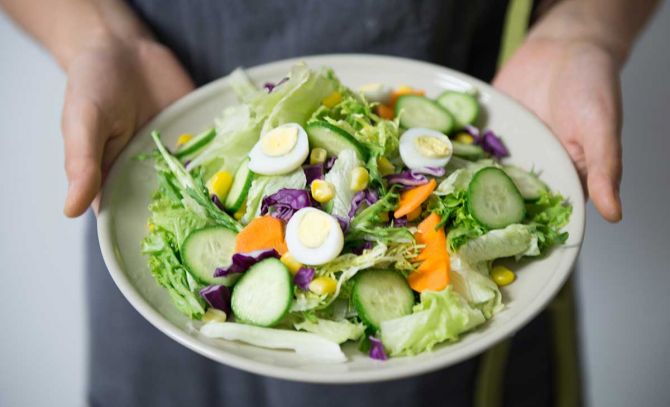'I challenge people just do it for a month to see how you feel, okay?'

You are a target for COVID-19.
So are all of us.
But Dr Aseem Malhotra doesn't believe we should all be sitting ducks waiting for COVID-19.
Instead, he believes, it is a time for action.
We need to prepare for it. Not just with all-essential masks, antiseptics and social distancing.
But prepare to ward it off strongly, if, god forbid, we get it.
Dr Malhotra has a diet of 21 to 28 days, that he outlines in his latest book -- titled The 21-Day Immunity Plan (external link) - that can make you COVID-19-ready and healthy enough to take on the disease with minimum risk.
A diet to actually build real immunity.
Research and his own medical practice, Dr Malhotra says, has shown that in about a month you can reverse dangerous blood levels and adequately improve your metabolic health: 'Our best defence to protect people's health is improving metabolic health by changing diet'.
And the feel-good outcome of such a diet will see that you continue on the same road, taking control of your life and making yourself healthier.
A London-based cardiologist and anti-obesity campaigner, Dr Malhotra has long been a very pull-no-punches advocate for health via your diet and lifestyle changes.
A pro-ghee physician, for those who have diabetes, hypertension and heart disease, he has long advised lifestyle changes as treatment and does not believe medications will provide a cure.
In address to the European Parliament last year he faulted government dietary advice and attacked food and pharmaceutical lobbies.
Recently, Dr Malhotra upped his quota of outspokenness a couple of notches.
When British Prime Minister Boris Johnson was seriously sick in intensive care for many days with COVID-19 in late April, Dr Malhotra told Good Morning Britain that the 16.5 stone* UK head of government had taken longer to recover from COVID-19 only because he was 'significantly' overweight and the risk from the disease was ten-fold for those over their ideal BMI.
One of the high-profile followers of Dr Malhotra's 21-day immunity plan is filmmaker Gurinder Chadha: 'Read this book and follow the plan, it may save your life.'
A supporter is American endocrinologist Professor Robert Lustig.
Dr Malhotra summarised to Vaihayasi Pande Daniel/Rediff.com some of the main highlights of his immunity plan.
It is must-reading for becoming a healthier you, during these anxious pandemic days.

When it comes to how one's metabolism is functioning, in your view, what are the underlying risk factors that can exacerbate COVID-19?
It is not just my view -- the evidence is very overwhelming.
The biggest risk factor is age, which in itself is linked to metabolic health.
Then, it's basically conditions related to excess body fat, in particular developed initially in the abdomen.
This even affects people who would have the illusion of thinking that they have a healthy or normal weight.
Body fat is an issue.
The specific risk factors associated together are your average blood glucose -- pre-diabetes and Type 2 diabetes.
Many people, for example, in India won't even realise that they are pre-diabetic.
They won't even know unless they get tested.
Blood pressure above 120/80 is a risk factor.
So many people again won't be getting managed specifically in terms of lifestyle (changes) with blood pressure over 120/80, so will be having hypertension.
Another marker is waist circumference.
 IMAGE: Dr Aseem Malhotra, NHS cardiologist and anti-obesity campaigner
IMAGE: Dr Aseem Malhotra, NHS cardiologist and anti-obesity campaignerFor Indians (stature) it is above 90 centimeters for a man, and 85 centimeters for a woman is abnormal.
Anyone can measure their waist at their belly button -- you get a tape measure and check that.
And then it's two specific markers in the cholesterol profile.
It's triglycerides, which is blood fat, and for normal you want that to be less than 1.7 millimoles/dl.
And your HDL -- which is your good cholesterol -- you want that be greater than one millimole.
Now, if any of these markers are out of range, then you have sub-optimal metabolic health.
But the most extreme, the most damaging, the most harmful version, which is associated with a greater severity of COVID-19 -- either hospital admission or death, making it at least three times more likely to die from COVID-19 if you get it and five times more likely to be hospitalised - is if you have metabolic syndrome, and any of those markers are abnormal.
And that is a big problem in India.
It is estimated, I think, that at least one in three Indians have metabolic syndrome.
It is a big problem there.
And that isn't being measured and it's not being addressed.
Now the good news, the positive news, which again is about empowering people, is that through very specific, relatively simple lifestyle changes, you can improve most of these markers within a few weeks, within 21 days.
In trials, in about 50 per cent people, you can reverse, you can come out of metabolic syndrome.
So, for example, three markers becoming two within 21 days.
One of the messages of the book is to highlight that.

In your book you have advocated better eating, more movement and reducing stress?
Absolutely.
But the eating is most important.
The only actual intervention that has been shown to reverse metabolic syndrome within 21 to 28 days on its own is dietary change.
Exercise and stress is good for the long term.

Can you give us some idea of what you mean by dietary change?
Very simple.
Most of all it is for people to do two things.
It is eliminating ultra-processed foods from the diet.
And doing that for a month.
I challenge people just do it for a month to see how you feel, okay?
And eliminating low-quality carbohydrates.
What does that mean?
Eliminating any packaged food or drink that has five or more ingredients.
You look at the ingredients of any packaged food, chocolate bars, mithai, crisps (chips) -- if it has five or more ingredients, comes out of a packet, don't eat it!
Low-quality carbohydrate is any sugary food or drink.
It includes smoothies, any fruit juice, syrups, honey, anything with sugar.
These are all to be avoided.
Anything with sugar or juice are to be avoided.
These are low-quality carbohydrates.
So, you eliminate ultra-processed food and low-quality carbohydrates.
You break the addiction to these foods, because these are the types of foods that encourage overeating, they're not good for your gut bacteria and they are linked to inflammation in the body, which is linked to a poor immune system response.
If you do that for a month, people generally will feel a lot better, healthier.
They will improve their health markers.
And they will probably start to lose significant amounts of body fat as well.
And this is the beginning of the journey basically.
Once people see the benefits, they're more likely to sustain it over a longer period of time because they think: 'Wow, I feel different. I feel healthier. My mental health is better. My physical health is better'.
Then they are able to break the addiction or the cycle of ultra-processed food and sugar, which is a huge, huge problem in India.
I mean, the amount of crap - pardon, my language -- that the average Indian is eating, and doesn't even realise it, is just astronomical. astronomical.
The other thing I want to mention is: It is very important is remove those industrial vegetable oils, these sunflower oils from your diet.
They are toxic to eat and when you cook in them.
I would say either cook in extra virgin olive oil, ghee, butter or coconut oil.
Extra virgin olive oil should be your ideal, but ghee is definitely much healthier than these industrial seed oils.

So, you're not saying to eliminate rice and roti?
Just avoid the junk food, right?
The first thing you can do is eliminate the junk.
But if you have any of those five markers abnormal, then you must remove the rice and other stuff as well.
I would say for a month eliminate it altogether.
Instead of your white rice, have something like quinoa or a cauliflower substitute -- Do that.
Get rid of all these bread, rotis, unless it is made of almond flour - difficult to get in India - you can get quinoa flour as well.
Get rid of all of that and just have more vegetables and whole fruit,
Get rid of all of it for one month -- you'll see a much bigger impact on your health.
And dal is okay?
Dal and pulses, channa, rajma, all that is fine.

What about dosa and idli?
They say that the fermentation improves the quality of the carbohydrate ie rice in the case of dosa and idli?
Small amounts of idli is fine.
But no white rice and roti for a month, if any of your markers are abnormal.
Eat lots of whole foods and no ultra-processed food.
That itself will have a big impact on people's health very quickly.
Then you can re-introduce stuff in smaller amounts.
For example, your white rice and your roti should be a total of less than 20 per cent of your diet.
Once you've managed to normalise these markers, less than 20 per cent of your calorie consumption should come from these things (rice and roti).
The problem is, like in South India, 50 per cent of what people are eating in terms of their calorie consumption or carbohydrate consumption is white rice.
And when you combine that with the mithai and all the other stuff you are eating that is a metabolic time bomb.
Many people are at home for much longer periods, working from home and no outings, during this COVID-19 period.
There's a lot of boredom because people are unable to get out of their homes much. So, though there is fear, maintaining a strict diet is harder and everyone is cooking more.
What can one cheat on?
I wouldn't cheat on anything!
One thing people should not fear now is facts.

So you're not saying one can have like 70 per cent dark chocolate or some fruit?
Oh yes 85 per cent dark chocolate absolutely -- this is a good cheat.
Fruit is fine.
But not so much the high-sugar fruit;
I would go for the low-sugar fruits (strawberries, melon, papaya, apple, guava**) and not have more than maybe three portions a day.
Things like mango, for example, are very, very sugary. Aam is sugary. So, would again avoid that for the first month.
Just so that people can un-sweeten their sweet tooth.
That's what it is about as well.
And Indians have a very sweet tooth.
**104 kilos
**according to WebMD.com and MayoClinic.com
- Earlier interview Ghee, butter, cheese, eggs: Yes! Sugar, carbs: NO!
*Kindly note the images have been posted only for representational purposes.
Feature Presentation: Ashish Narsale/Rediff.com












 © 2025
© 2025